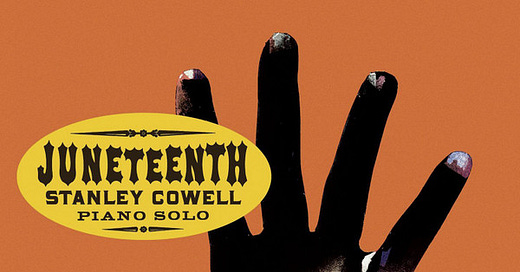Stanley Cowell (1941—2020) was a pianist of remarkable accomplishment, someone nearly neck and neck with Chick Corea and Keith Jarrett in terms of modern jazz fluidity, but with added skills in the old school stride-to-swing department.
Cowell also had serious ambitions as a composer, and at least one piece, “Equipoise,” has entered the repertoire.
Like so many, Cowell was underrated and remains unheralded. But I think the time of his 2015 Juneteenth Suite will come. This work is ambitious but it is not too ambitious, comprised of nine tight sections running half-an-hour. The themes are rich and fully developed, and everything is written beautifully for the instrument.
1 Introduction
2 Proclamation
3 Really Dreams Echoes
4 Anticipation Of The Coming Of Freedom
5 Commentary On Strange Fruit
6 Nostalgia For Homelands
7 Proclamation Interruptions
8 Darkness Transforming
9 Finale
While the word Juneteenth has a lot of emotional associations, Cowell’s temperature is mild, resigned, and subtle. Many European composition devices are used; indeed, as far as I can tell, it is almost all fully-notated. While there are a few enjoyable stylistic references to gospel and the blues, most of the music is in its own bag, with certain leitmotifs returning again and again.
One track, “Reality Dreams Echoes,” is a crazy-quilt of Americana themes including “Dixie,” “Swing Slow, Sweet Chariot,” and “By the River,” concluding with “The Star-Spangled Banner.”
The most conventionally “jazz” movement with a bit of obvious improvisation is “Nostalgia For Homelands,” with a kind of repeating odd-meter cycle that undulates like modern R ‘n B.
A pianistically advanced set of variations on “Strange Fruit” is the longest and most elaborate movement.
The recording is perhaps not packaged that well, for in my view, Juneteenth Suite should stand alone, not sandwiched between other worthy but “normal” piano tracks. In Juneteenth Suite Cowell delivered a masterpiece, and in retrospect perhaps even a final magnum opus.
(Footnote: I am open to collaborating with a talented youngster—or someone older who has time to transcribe—with the aim of generating a published score to Juneteenth Suite suitable for other pianists to play in concert.)




There's a great story about Cowell, at six years of age, hearing Art Tatum playing "You Took Advantage of Me" on his parents' Storey & Clarke studio upright. It's in James Lester's Tatum biography; see https://archive.org/details/toomarvelousforw0000lest/page/141/mode/1up?view=theater.
Terrific recommendation - thank you! I don't know Stanley Cowell's music, and this is a great introduction.
I noted that a couple of sources - Discogs and Amazon (hate the company, but wanted to get another source for what I'm about to mention) - note that the suite has 10 parts, with "Resolution" following "Finale."